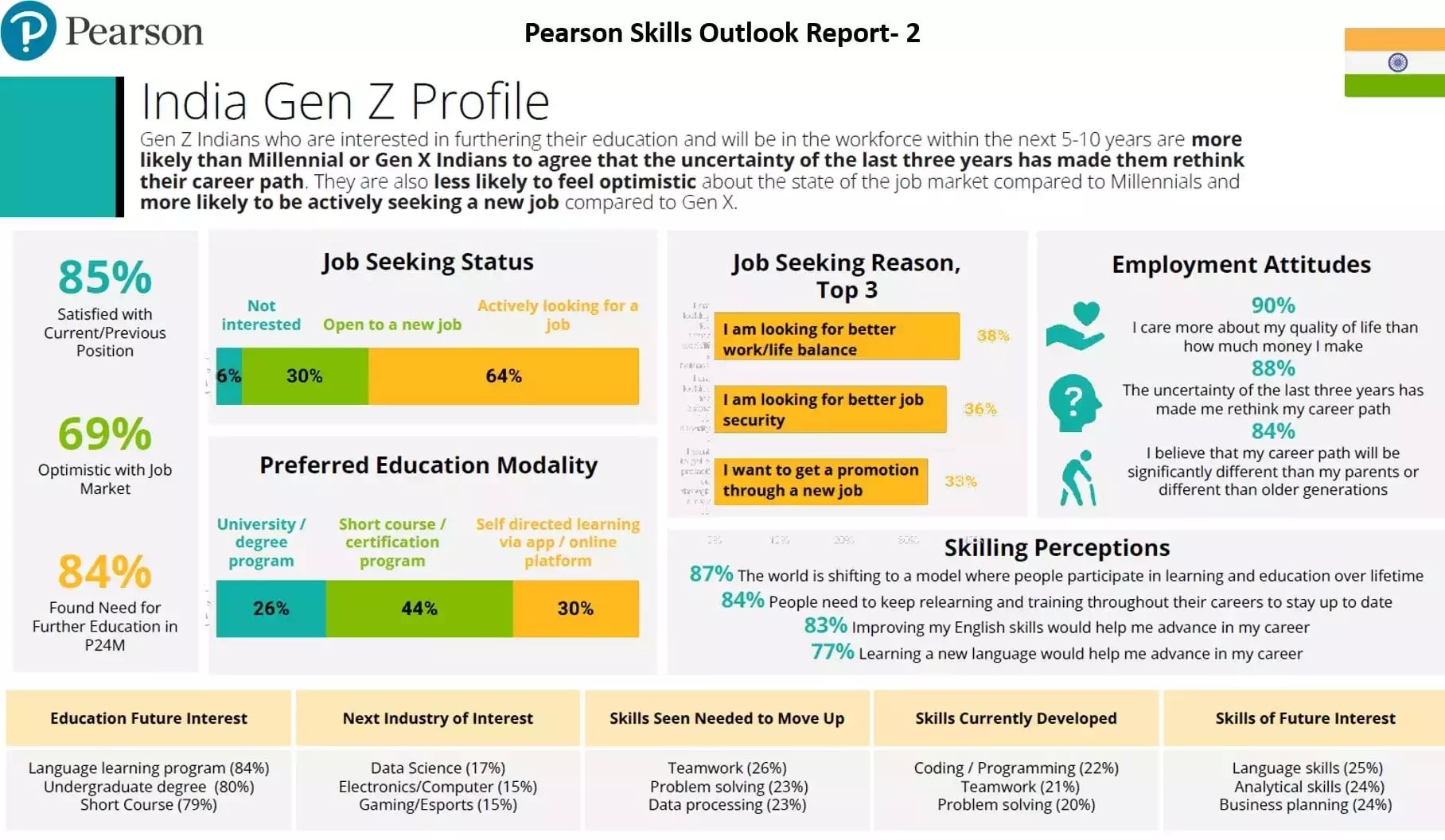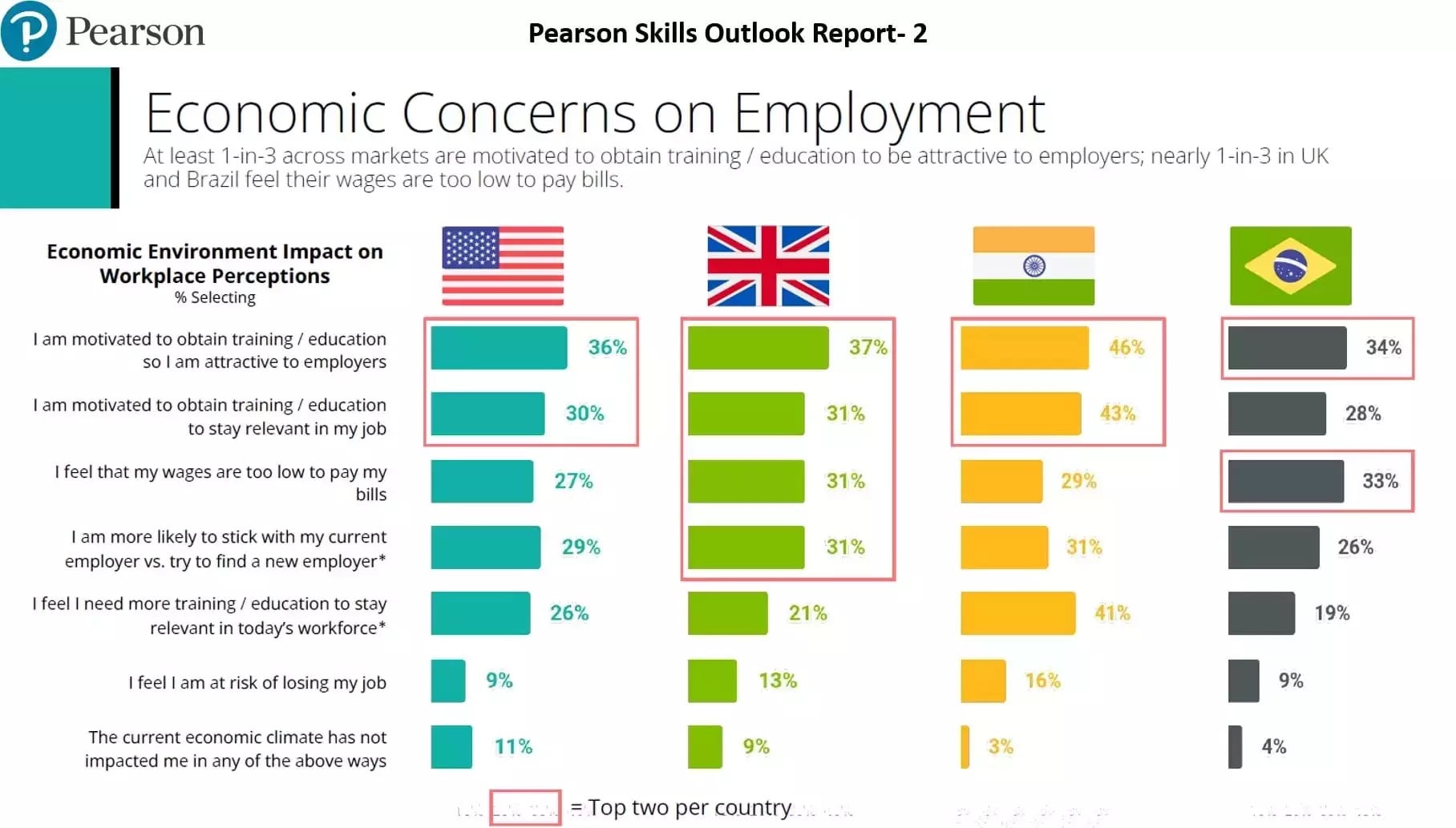Workers open to new employment opportunities and obtain new education amid economic uncertainty: Pearson report
by
A majority of Gen Z workers in India are reconsidering their career paths due to the challenging economic situation and work environment. They are actively seeking new jobs and are less optimistic about the job market compared to millennials. Factors driving this quest for newer jobs include better pay, flexibility, and work-life balance.
Amid ever challenging economic situation and work environment, majority of Gen Z in India is rethinking their career path either by obtaining newer skills and education to rise further in their careers or help get newer jobs.
According to the Pearson Skills Outlook Survey – Employee view, the Gen Z in India are likely to be more actively seeking a new job as compared to Gen X but are less likely to feel optimistic about the state of the job market compared to millennials. The survey pointed out that 88% of Gen Z workers in India have had to rethink their career path due to the uncertainties of the last three years. This is significantly higher than the 67% of millennials and 55% of Gen X workers who said the same.

The quest for newer jobs is due to a number of factors, including the desire for better pay, more flexibility, and a better work-life balance. With training and education, workers are taking steps to improve their own skills and marketability. This will help to ensure that the workforce is prepared for the challenges of the future. Additionally, the rise of automation and artificial intelligence is making many traditional jobs obsolete, forcing Gen Z workers to consider new and emerging career paths.
According to the Pearson Survey, education and training are seen as vital sources for career advancement. This is because the Gen Z knows that upgrading skills through additional education or training will make them more marketable and better equipped to handle the demands of an evolving job market. The type of education Indian workers are most interested in are language learning programs and short courses.

The report, which polled 4,000 people in four countries (US, UK, India, and Brazil) to see what skills they were prioritizing for their career development, illustrated that across markets, short courses, employer-sponsored training, and university degrees are seen as the most needed, to move up from current positions. This was seen to be true especially in India, with Certifications from professional organizations (34%) and from platforms (34%) being the top two types of education felt needed to advance their careers. This illustrates that employers offering certifications are also seen as more attractive to the working populace.
Skilling came out as one of the most important and sought after trait by employees. The study pointed out that 75% -- 3 out of 4 Indian employers provide the opportunity to upskill or reskill as a benefit, and of those workers offered the benefit, nearly 9 in 10 (92%) of Indians taking advantage of the benefit. Indian workers believe that tech focussed skills can get them new opportunities and get them into new industries.
The top three skills Indian workers are currently developing include Teamwork, Problem Solving and Data Processing. The skills they want to obtain in the near future include Coding and Programming, AI, Problem Solving and Data Processing.
The study stated that while 88% of Indian workers expect to continue learning throughout their careers to stay up to date, 82% Indian workers believe that learning a new language would help them advance in their career. Most Indian workers believe that enhanced English skills is a prerequisite for better career opportunities. A majority (85%) believe that improving their English skills would help them advance in their career
It also said that workers also prefer short courses as an education modality and top future learning opportunity.
The survey revealed that a majority of Gen Z in India are enrolling for skill-based programs to make themselves more marketable and employable because they believe that a tech focussed environment can get them new opportunities and get them into new industries. It said that the Gen Z are focusing on tech based skills both on their own and also those provided by employers to enhance their career growth. This is because tech based skills are set to become the key skill for emerging industries in India.

The Pearson survey said that a majority of Indian workers (84%) feel some university education is necessary for getting good jobs or having a successful career. A majority of Gen Z are willing to obtain a university education to improve their job prospects. The survey also revealed that 88% of Indian workers are currently learning or planning to learn new skills or enrolling in a program to further their education with an overall aim to enhance their career and get better jobs.
Employers are also aware that higher education and skills help employees in advancing their careers and as such, are engaging actively in training their workers. Being open to change and continuously learning can help individuals navigate these uncertain times and position themselves for success in the long run.
The trend of workers being open to new opportunities is likely to continue in the coming years. As the economy becomes more uncertain, workers will be increasingly looking for ways to improve their financial situation and have a better work-life balance through newer opportunities.
The author is Country Head, Pearson India
About Pearson
At Pearson, our purpose is simple: to add life to a lifetime of learning. We believe that every learning opportunity is a chance for a personal breakthrough. That’s why our c.20,000 Pearson employees are committed to creating vibrant and enriching learning experiences designed for real-life impact. We are the world’s leading learning company, serving customers in nearly 200 countries with digital content, assessments, qualifications, and data. For us, learning isn’t just what we do. It’s who we are.
Visit us at pearsonplc.com
For more information, please contact: Bhavya Suri, PR & Corporate Affairs, Pearson India & MENA- bhavya.suri@pearson.com

